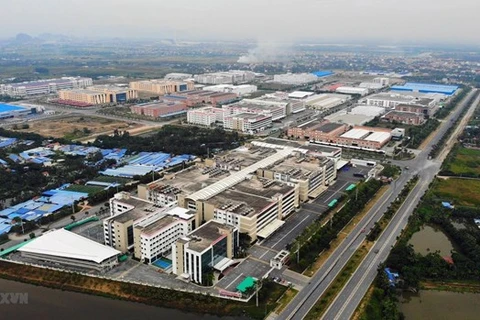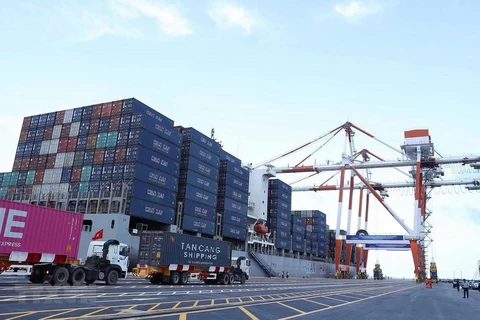 Producing earphone components at JEP Company in Kim Dong Industrial Park, Hung Yen province (Photo: VNA)
Producing earphone components at JEP Company in Kim Dong Industrial Park, Hung Yen province (Photo: VNA) Resolution No 01/NQ-CP on key measures to carry out the 2021 socio-economic development plan and State budget estimates outlines growth scenarios for each quarter and for each sector throughout the year.
The Government set a goal of posting growth of 6.5 percent and increasing workplace productivity by nearly 4.8 percent and health insurance participation to around 91 percent. The rate of multi-dimensionally poor households is expected to fall by 1-1.5 percent.
With the results in the first quarter, if the growth targets in the Resolution for subsequent quarters are reached, 2021’s GDP growth is estimated to come in at 6.37 percent; exceeding the 6 percent target set by the National Assembly but still lower than the target set in the Resolution.
Minister of Planning and Investment Nguyen Chi Dung said it is necessary to urgently implement the Resolution to achieve objectives in the socio-economic development plan in the 2021-2030 and 2021-2025 periods.
In a report submitted to the Government in January, the Ministry of Planning and Investment (MPI) proposed that priority be given to disease prevention and control in order to ensure the health of the citizenry and minimise the impact of the pandemic on the national economy.
It also proposed measures to promote economic growth through the “three-horse carriage” of investment, exports, and consumption.
The banking and finance sector continues to implement sensible fiscal and monetary policies to ensure macro-economic stability and stimulate economic growth, cut unnecessary expenses, especially regular spending, maintain a reasonable interest rate level and improve credit quality for priority areas, and strictly control credit in areas of potential risk.
Monetary and fiscal policies need to be assessed carefully towards developing support policies for those affected by COVID-19, especially services, tourism, and transport.
The Ministry of Industry and Trade (MoIT) is responsible for urgently building and implementing policies to stimulate domestic consumption, improve links between production and consumption in the supply chain, and promote the development of distribution networks associated with the “Vietnamese give priority to Vietnamese goods” campaign, to boost sustainable consumption demand.
It is also working to improve institutions and create favourable conditions for the development of e-commerce and e-payments as well as supporting export enterprises to expand markets through cross-border e-commerce.
Meanwhile, the MPI also proposed continued improvements to the quality of institutions, thus creating an open and favourable business and investment environment for enterprises.
Regarding the management, disbursement, and use of overseas development assistance (ODA), ministries, sectors, and localities must determine project priorities in association with ensuring reciprocal capital, and promote investment projects in the form of public-private partnerships, to attract investment capital from the private sector, especially for transport infrastructure projects.
Localities have been urged to focus on promoting international cooperation, diversifying import and export markets, taking full advantage of free trade agreements (FTA) Vietnam has signed, strengthening defence measures, and building early warning systems to protect domestic production and support businesses responding to trade defence lawsuits./.
VNA























